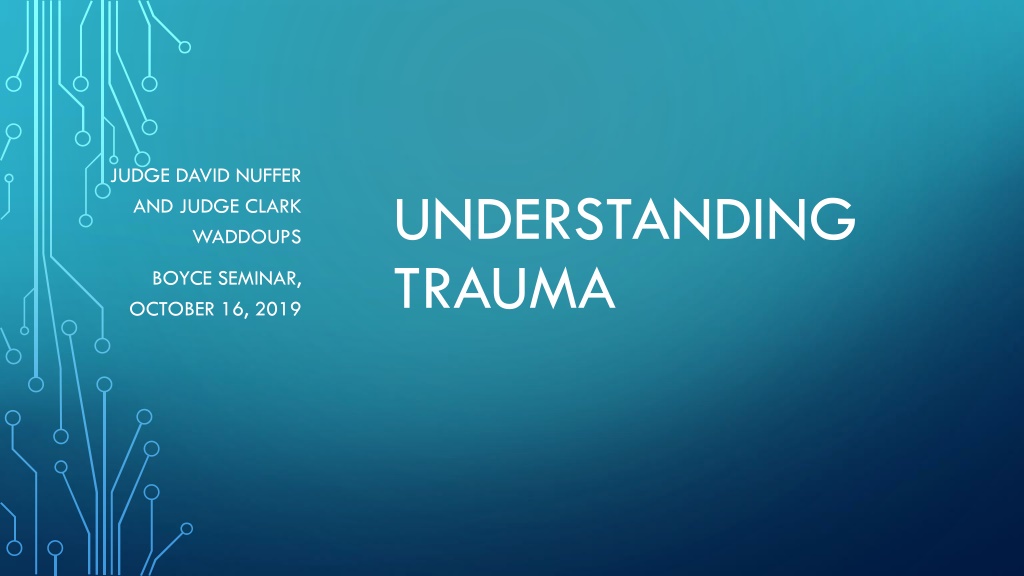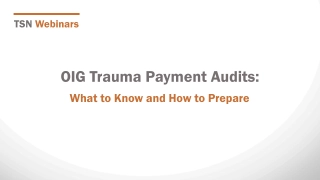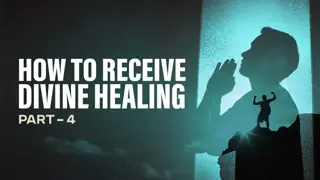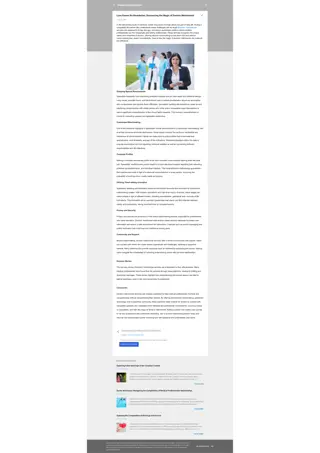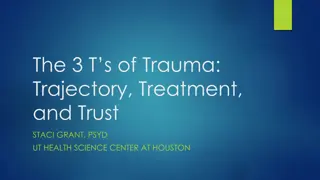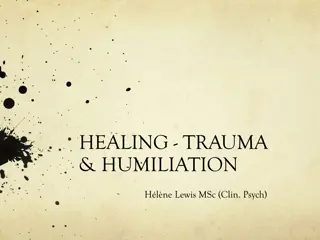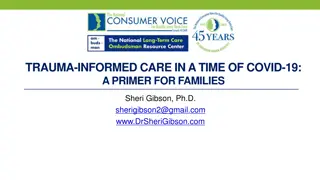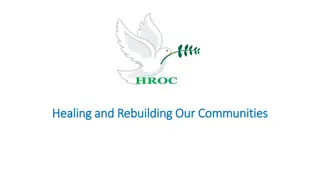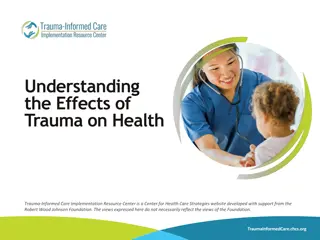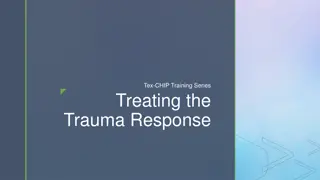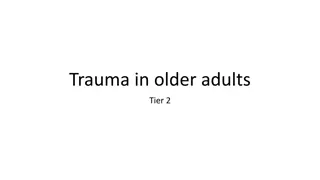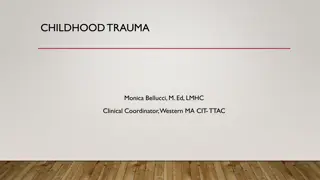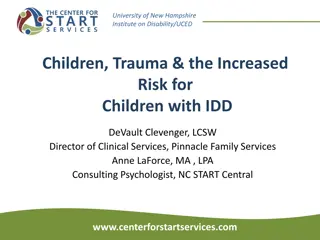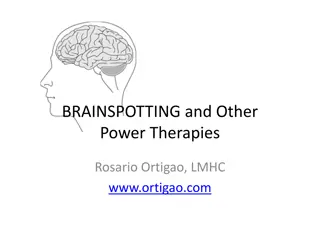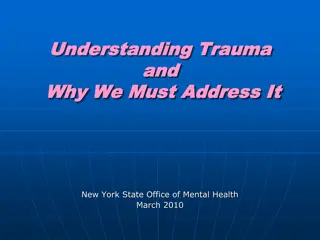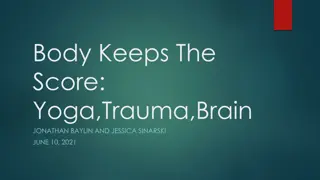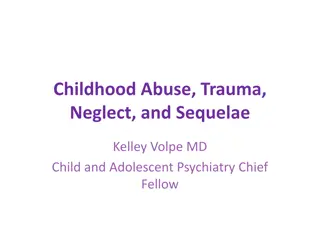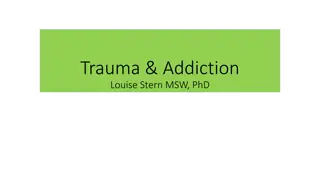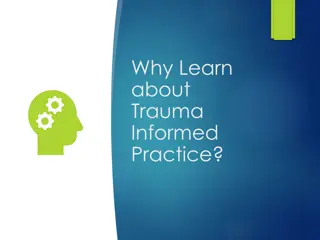Understanding Trauma: Causes, Effects, and Healing
Explore the complexities of trauma through insights on the causes, effects, and healing processes. Delve into the impact of PTSD on the brain's attention patterns, common triggers of trauma, and the profound effects trauma can have on individuals. Discover how trauma manifests in hypervigilance, memory blocks, and challenges in maintaining healthy relationships. Learn from expert perspectives on the body's role in retaining traumatic memories and the importance of addressing trauma for holistic healing.
Download Presentation

Please find below an Image/Link to download the presentation.
The content on the website is provided AS IS for your information and personal use only. It may not be sold, licensed, or shared on other websites without obtaining consent from the author. Download presentation by click this link. If you encounter any issues during the download, it is possible that the publisher has removed the file from their server.
E N D
Presentation Transcript
JUDGE DAVID NUFFER AND JUDGE CLARK WADDOUPS UNDERSTANDING TRAUMA BOYCE SEMINAR, OCTOBER 16, 2019
STAN AND UTE LAWRENCE SEPT. 3, 1999 https://www.cbc.ca/natureofthings/episod es/ptsd-beyond-trauma https://windsorstar.com/news/15-years- after-401-crash-trauma-remains
Normal versus PTSD. Patterns of attention. Milliseconds after the brain is presented with input it starts organizing the meaning of the incoming information. Normally, all regions of the brain collaborate in a synchronized pattern (left), while the brainwaves in PTSD are less well coordinated; the brain has trouble filtering out irrelevant information and has problems attending to the stimulus at hand.
CAUSES OF TRAUMA Domestic violence Witness deposition Divorce Death of family member, lover, friend, teacher, or pet Natural disasters Serious illness War Physical pain or injury (e.g. severe car accident) Moving Sexual assault Prison stay Parental abandonment
THE BODY KEEPS THE SCORE: BRAIN, MIND, AND BODYINTHE HEALINGOF Trauma is much more than a story about something that happened long ago. The emotions and physical sensations that were imprinted during the trauma are experienced not as memories but as disruptive physical reactions in the present. TRAUMA BESSEL VAN DER KOLK, M.D. p. 206
EFFECTS OF TRAUMA Hypervigilance Numbing Loss of speech Memory blocks Depersonalization, dissociation, loss of self, split personality Inability to choose, control, flee Inability to maintain healthy relationships Addiction to trauma, drugs, work
HOW DO YOU TURN A NEWBORN BABY WITH ALL ITS PROMISE AND INFINITE CAPACITIES INTO A THIRTY-YEAR-OLD HOMELESS DRUNK? THE BODY KEEPS THE SCORE: BRAIN, MIND, ANDBODYINTHEHEALINGOFTRAUMA, P. 145 Bessel Van Der Kolk, M.D
ADVERSE CHILDHOOD EXPERIENCES (ACE) STUDY 1 in 10 answered yes Did a parent or other adult in the household often or very often swear at you, insult you, or put you down? Did one of your parents often or very often push, grab, slap, or throw something at you? 1 in 4 answered yes 1 in 4 answered yes Did one of your parents often or very often hit you so hard that you had marks or were injured?
ADVERSE CHILDHOOD EXPERIENCES (ACE) STUDY, Cont. 28% of women answered Yes 16% of men answered Yes Did an adult or person at least 5 years older ever have you touch their body in a sexual way? Or Did an adult or person at least 5 years older ever attempt oral, anal, or vaginal intercourse with you? 1 in 8 answered yes As a child, did you witness your mother sometimes, often, or very often pushed, grabbed, slapped, or had something thrown at her? Or as a child, did you witness your mother sometimes, often, or very often kicked, bitten, hit with a fist, or hit with something hard?
ACE scores of 4 or higher: Learning and behavioral problems Higher workplace absenteeism, financial problems, lower life-time income Chronic depression (66% in women, 35% in men) Taking antidepressants or prescription painkillers Self-reported suicide attempts Traumatic experiences are often lost in time and concealed by shame, secrecy, and social taboo, but the [ACE] study revealed that the impact of trauma pervaded these patients adult lives. ACE scores of 6 or higher: Seven times more likely to be alcoholic 4,600% greater likelihood of IV drug use p. 148
TRAUMA BREEDS FURTHER TRAUMA; HURT PEOPLE HURT OTHER PEOPLE. THE BODY KEEPS THE SCORE: BRAIN, MIND, ANDBODYINTHEHEALINGOFTRAUMA, P. 350 Bessel Van Der Kolk, M.D
THE BODY KEEPS THE SCORE: BRAIN, MIND, AND BODYINTHE HEALINGOF Being able to feel safe with other people is probably the single most important aspect of mental health; safe connections are fundamental to meaningful and satisfying lives. TRAUMA BESSEL VAN DER KOLK, M.D. p. 81
ADDRESSING TRAUMA REQUIRES HUMAN CONNECTION Social support is not the same as merely being in the presence of others. The critical issue is reciprocity: being truly heard and seen by the people around us, feeling that we are held in someone else s mind and heart. THE BODY KEEPS THE SCORE: BRAIN, MIND, ANDBODYINTHEHEALINGOFTRAUMA, p. 81 BESSEL VAN DER KOLK, M.D.
Yoga, Tai Chi, Qigong Mindfulness Neurofeedback RECOVERY REWIRING THE MIND AND BODY Guided restructuring EMDR Theatre Dance
PRACTICAL IMPLICATIONS FOR LAWYERS Preparing/interviewing witnesses Assessing client s truthfulness Advising client on how to proceed in case Jury selection Presenting a case to the jury CRIMINAL CASE IMPLICATIONS: Decisions about pleading guilty, sentencing issues, conditions for supervised release Treating your own practice-related trauma
Beneath the surface of the protective parts of trauma survivors there exists an undamaged essence, a Self that is confident, curious, and calm, a Self that has been sheltered from destruction by the various protectors that have emerged in their efforts to ensure survival. Once those protectors trust that it is safe to separate, the Self will spontaneously emerge, and the parts can be enlisted in the healing process. THE BODY KEEPS THE SCORE: BRAIN, MIND, ANDBODYINTHEHEALINGOFTRAUMA Bessel Van Der Kolk, M.D.
JUDGE DAVID NUFFER AND JUDGE CLARK WADDOUPS UNDERSTANDING TRAUMA BOYCE SEMINAR, OCTOBER 16, 2019
